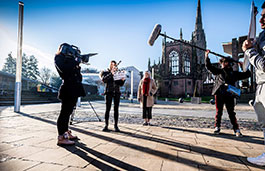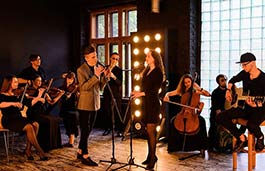Search
Popular Music Performance and Songwriting BA (Hons)
Study level: Undergraduate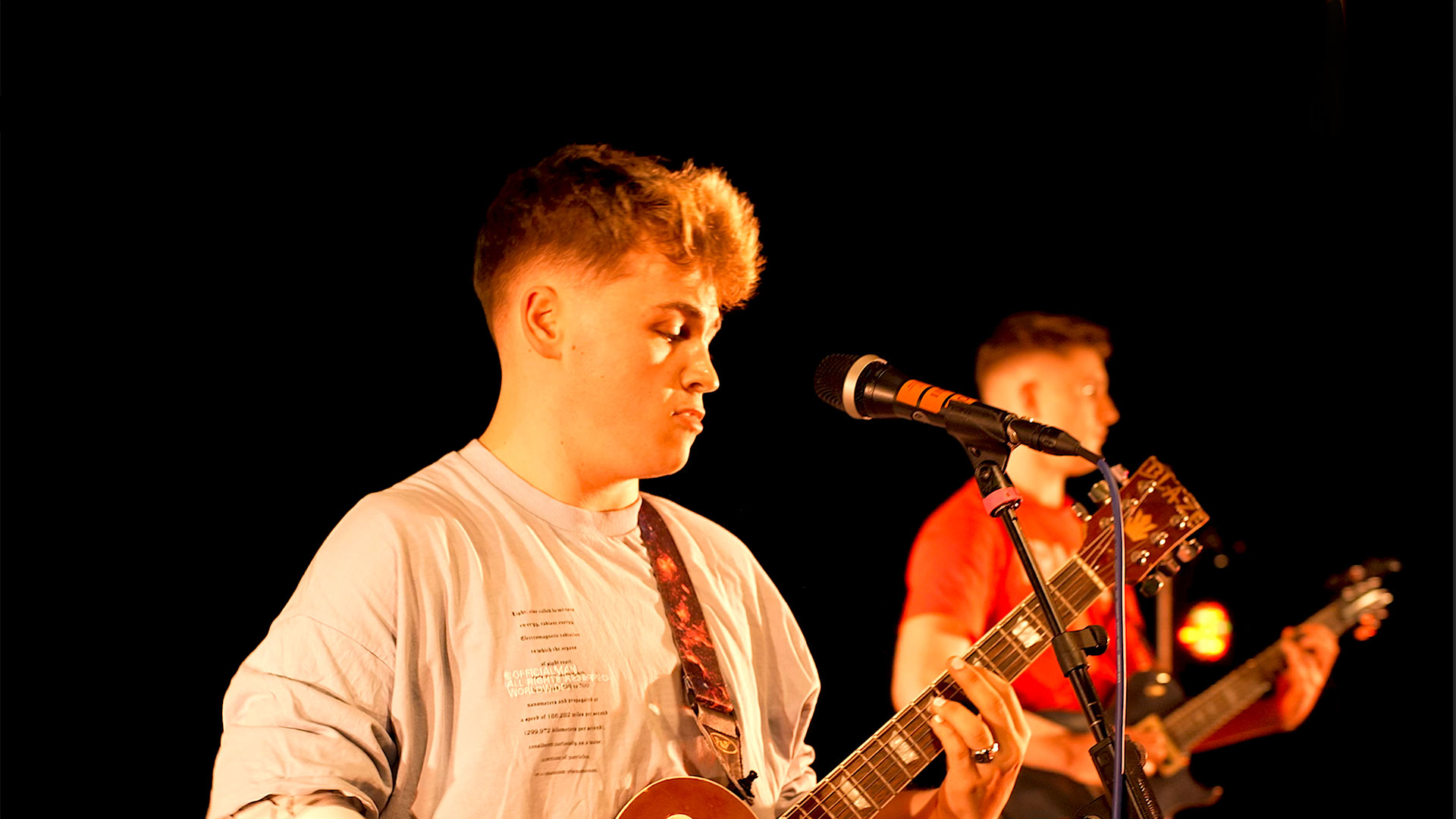
The first step to becoming a popular musician is to think of yourself as one. Get trained up with our talent-building course to open up a world of opportunities!
Course features
Year of entry
Location
Coventry University (Coventry)
Study mode
Full-time
Sandwich
Duration
3 years full-time
4 years sandwich
Course code
W315
Start date
September 2025
The information on this page is for 2024-25 entry and should be used as guidance for 2025-26 entry. Please keep checking back on this course page to see our latest updates.
Course overview
This course is a practice-based, ‘outward-facing’ course that seeks to prepare you to be a versatile, flexible, and adaptable operator within the twenty-first-century music industry.
- We are looking to produce critically astute musicians who are confident performers and songwriters, working with today’s technologies to make, reproduce, and disseminate music, and who understand the potential income streams available to them in the profession.
- Unleash your skills in our Steinberg Certified Training centre where you can build your practical talents and emerge industry-ready4.
Joint Top Modern University for Career Prospects
Guardian University Guide 2021 and 20225 QS Stars for Teaching and Facilities
QS Stars University RatingsTop 5 UK Student City (Coventry)
QS Best Student Cities Index 2023Why you should study this course
- We offer you a focus on creative-based music skills in performance and songwriting which is underpinned by popular music theory and the chance to experience this in a vibrant and creative environment which gives you access to professional practices, new research and outstanding graduate support.
- You get to engage effectively with a range of technology in the creation, performance and recording of music, including recording studios and live performance. And you can develop your own personal website (e.g. Domain of One’s Own) which by the later stages of the course, is intended to be a professional-looking, outward-facing website that demonstrates the breadth of your learning and professional experience.
- Visiting master classes which are embedded within the course and which have included: Black Sabbath founder Tony Iommi, singer/songwriter Gwyneth Herbert; composers: Nick Ryan, Derek Nesbitt, Kit Turnbull and Juwon Ogungbe; sonic artist Trevor Wishart; guitarist Sam Cave; avant-garde bass clarinettist, Sarah Watts; composer and multi-instrumentalist Frank Moon; jazz keyboardist and music production composer, Andy Quinn. Masterclass visitors are subject to availability and may change each year.
- There are opportunities to showcase your performing and songwriting talent in a public context throughout your studies. Performance spaces on-site include a large room with two grand pianos, suitable for small recitals, and The Hub’s Square One, a large performance space kitted out with PA, amps, drums and a grand piano4. You may have the opportunity to perform in at least one of the following city's live music venues (subject to availability), which previously has included: Studio 54, The Herbert Art Gallery, Kasbah, The Phoenix, The Cross, Drapers, The Cottage, The Tin, The Litten Tree, Ego Arts and Nexus.
- You will have access to our extensive specialist facilities: a music seminar room with grand piano, PA, amps, drum kit, 5.1 surround sound and directly linked to a control room for recording; music practice rooms with pianos, drums and PA; three band rooms; a 5.1 studio and live room; instrument storage; an iMac music tech suite plus further state-of-the-art recording studios running Pro Tools, Logic, Live, Max and Sibelius on Apple macs4.
Accreditation and professional recognition
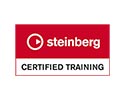
Steinberg Certified Training Centre
Steinberg Certified Trainers and Training Centres help you get the most from your Steinberg products. All partners certified1 by Steinberg use the latest Steinberg software and have extensive current product and systems knowledge.
Find out more about our undergraduate music courses.
What you'll study
This course has a common first year.
The common first year enables you to work alongside students doing similar courses to you, to widen your knowledge and exposure to other subject areas and professions. You will have the opportunity to collaborate with other students, so you can share your insights and experience which will help you to develop and learn.
If you discover an interest in a specific subject you have studied, upon successful completion of your first year, you could swap degrees with another course in your common first year (subject to meeting progression requirements).
Common first year courses
- Music and Audio Production BA (Hons)
- Popular Music Performance and Songwriting BA (Hons)
We regularly review our course content, to make it relevant and current for the benefit of our students. For these reasons, course modules may be updated.
How you'll learn
We seek to provide you with the opportunity to develop a solid foundation of knowledge, practical experience and a professional portfolio with which you can launch a career within the global field of popular music, related industries, or postgraduate study.
Teaching contact hours
We understand that everyone learns differently, so each of our courses will consist of structured teaching sessions, which can include:
- On campus lectures, seminars and workshops
- Group work
- Self-directed learning
- Work placement opportunities2
The number of full-time contact hours may vary from semester to semester, however, on average, it is likely to be around 12 contact hours per week in the first and second year dropping to around 10-12 contact hours per week in the third and final year as you become a more independent learner. As an integral element of the popular music course, we offer small group instrumental lessons on your chosen instrument from one of the following: keyboards, voice, guitar, bass or drums.
Additionally, you will be expected to undertake significant self-directed study of approximately 15 hours each week, depending on the demands of individual modules.
Part of university life is undertaking self-directed learning. During a typical week you will have time that allows you to work independently to apply the skills and knowledge you have learnt in taught or facilitated sessions to your projects or assignment briefs. This self-directed learning allows you to use your research skills, consolidate your knowledge or undertake collaborative group work.
As an innovative and enterprising institution, the university may seek to utilise emerging technologies within the student experience. For all courses (whether on-campus, blended, or distance learning), the university may deliver certain contact hours and assessments via online technologies and methods.
Since COVID-19, we have delivered our courses in a variety of forms, in line with public authority guidance, decisions, or orders and we will continue to adapt our delivery as appropriate. Whether on campus or online, our key priority is staff and student safety.
Assessment
This course will be assessed using a variety of methods which will vary depending upon the module. Assessment methods include:
- Coursework
- Tests
- Essays
- Practical or project work
- Presentations/posters
This course is predominantly assessed by coursework.
The Coventry University Group assessment strategy ensures that our courses are fairly assessed and allows us to monitor student progression towards the achieving the intended learning outcomes. Assessments may include exams, individual assignments or group work elements.
International experience opportunities
Music is an international industry. We explore a diverse range of musicians, musical styles and cultures. We have also been fortunate enough to attract a number of guest speakers, including the New York ‘cello innovator’ (Time Out NY) Madeleine Shapiro and Martin Atkins of cult band, Public Image Ltd. (Guest speakers are subject to availability).
Students have previously travelled abroad for a year in Cyprus, Spain, Finland, South Korea and Canada. We also try to organise an optional annual overseas fieldtrip (which may be subject to additional costs, availability, application and meeting any applicable visa requirements). Recent students were able to go on a three-day music cultural trip to Vienna, where students took in concerts and the Mozart and Schoenberg museums. We have previously visited Prague and New York, which included seeing the Broadway show Chicago plus a workshop with some of the cast, as well as going to Carnegie Hall2.
Entry requirements
Typical offer for 2024/25 entry.
Fees and funding
2023/24 tuition fees.
| Student | Full-time | Part-time |
|---|---|---|
| UK, Ireland*, Channel Islands or Isle of Man | 2025/26 fees TBC 2024/25 fees - £9,250 per year |
Not available |
| EU | 2025/26 fees TBC 2024/25 fees - £9,250 per year with EU Support Bursary** 2025/26 fees TBC 2024/25 fees - £19,850 per year without EU Support Bursary** |
Not available |
| International | 2025/26 fees TBC 2024/25 fees - £19,850 per year |
Not available |
If you choose to do a work placement2, you should consider travel and living costs to cover this. There is also a tuition fee3 of £1,250 that will cover your academic support throughout your placement year.
For advice and guidance on tuition fees and student loans visit our Undergraduate Finance page and see The University’s Tuition Fee and Refund Terms and Conditions.
We offer a range of International scholarships to students all over the world. For more information, visit our International Scholarships page.
Tuition fees cover the cost of your teaching, assessments, facilities and support services. There may be additional costs not covered by this fee such as accommodation and living costs, recommended reading books, stationery, printing and re-assessments should you need them. Find out what's included in your tuition costs.
The following are additional costs not included in the tuition fees:
- Any optional overseas field trips or visits: £400+ per trip.
- Any costs associated with securing, attending or completing a placement (whether in the UK or abroad).
- Instruments and accessories (if you choose to play your own instrument).
*Irish student fees
The rights of Irish residents to study in the UK are preserved under the Common Travel Area arrangement. If you are an Irish student and meet the residency criteria, you can study in England, pay the same level of tuition fees as English students and utilise the Tuition Fee Loan.
**EU Support Bursary
Following the UK's exit from the European Union, we are offering financial support to all eligible EU students who wish to study an undergraduate or a postgraduate degree with us full-time. This bursary will be used to offset the cost of your tuition fees to bring them in line with that of UK students. Students studying a degree with a foundation year with us are not eligible for the bursary.
Facilities
At Coventry, students benefit from superb facilities so they can build on their practical talent4.
Facilities include:
- Several recording studios (including SSL and Neve mixing desks)
- Various live rooms and performance spaces
- An iMac music tech suite plus further state-of-the-art recording studios running Pro Tools, Logic, Live, Max and Sibelius on Apple macs
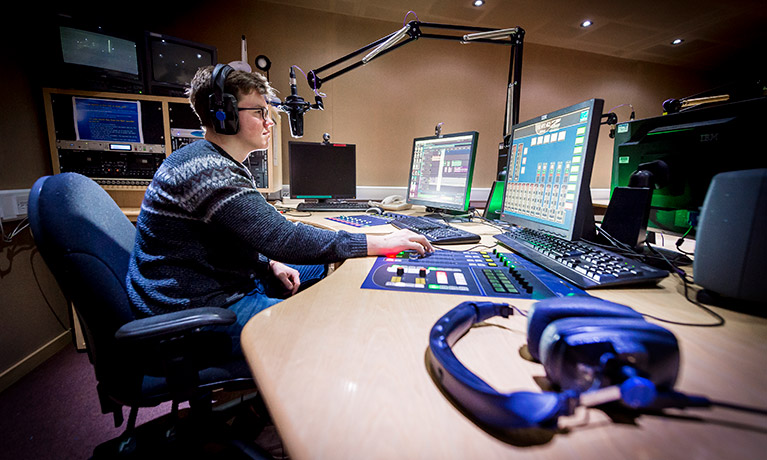
Recording studios
With some of our courses, you can have access to five recording studios, instrument storage, and an iMac music tech suite. We also have state-of-the-art recording studios running Pro Tools, Logic, Live, Max and Sibelius on Apple macs.
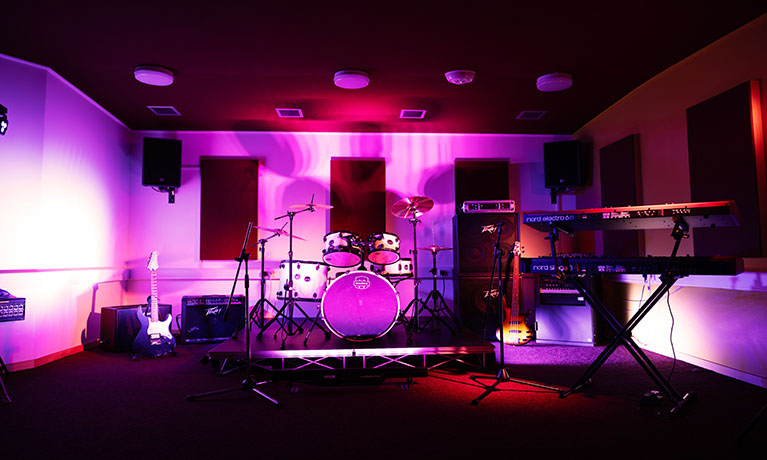
Performance spaces
Our Ellen Terry Building has a dance performance space, two dance studios and a theatre workshop. It also has dressing rooms and storage with around 3,500 costume items and 1,500 accessories.
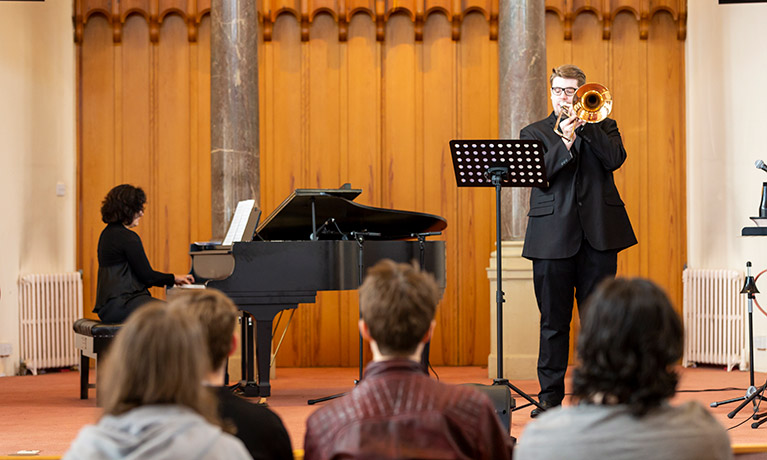
Music seminar room
A great space for our budding musicians, our specialist music seminar room comes with a grand piano, PA, amps, drum kit and 5.1 surround sound, all directly linked to a control room for recording.
Careers and opportunities
On successful completion of this course you will be able to:
- Demonstrate a professional approach to music making in the areas of performance, songwriting and music production in an international context.
- Evaluate and utilise established and experimental approaches to music-making within an international context.
- Demonstrate professional competence in a variety of performance, music-creation, re-creation, and presentation modes and contexts, both conventional and unconventional.
- Apply analytical, reflective, and critical skills to the evaluation of your own work, and to that of others, in the global music industry.
- Manage your own professional development and profile in the music industry.
- Demonstrate that you are an enterprising, creative, innovative, and flexible practitioner able to work with diverse communities within a global context.
- Work in a professional manner so you can effectively function in a range of roles and responsibilities.
There is a strong emphasis within the course on future career paths. This is aimed not only to help you to explore what your chosen career path might be, but also to help build a professional level of business skills and knowledge.
Our graduates pursue careers as performers, sound designers and composers. This degree also enables direct progression to suitable courses while others undertake the appropriate qualifications to become teachers in schools and colleges, or they become freelance instrumental or music theory teachers. Graduates also work with community arts organisations or as arts administrators.
Where our graduates work
Previous graduates include a leading professional guitarist and author of a series of advanced guitar handbooks, a recording artist who has released three EPs to date, a YouNow live-streamer and songwriter, an examiner for Rockschool, PhD in composition, and a London-based professional drummer doing a PhD.
Further study
- Events and Experience Management MSc
- Film and Media Production MA
- Media Management MA
- Virtual and Augmented Reality MA
You may be entitled to an alumni discount on your fees if you decide to extend your time with us by progressing from undergraduate to postgraduate study.
Graduate Immigration Route visa
Based on current information from the UK Government, international students whose study extends beyond summer 2021 may be eligible for a visa under the UK Government’s Graduate Immigration Route, which will enable students to stay and work, or look for work, in the UK at any skill level for up to two (2) years. Check the most up to date guidance available to check your eligibility and any updates from the UK Government before making an application or enrolment decision.
How to apply
You may also like
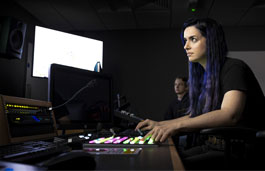
Music and Audio Production BSc (Hons)

Digital Media BA (Hons)
